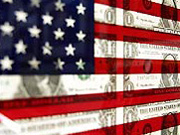|
 |
The twin budget deficits have
caused market jitters
|
The US budget
deficit is set to reach a record $427bn (£229bn) in 2005, the White House
has predicted.
But officials said the administration would meet its pledge to cut the
deficit in half over five years, partly by controlling public spending.
The forecast takes account of an extra $80bn the White House is seeking
from Congress to fund military operations.
It comes as a non-partisan watchdog said the 2005 deficit, not
including military costs, would be $368bn.
The Congressional Budget Office (CBO) had
previously forecast a $348bn shortfall
in the 2005 fiscal year.
The US budget deficit hit $412bn in the 12 months
to 30 September 2004, after reaching $377bn in the previous fiscal year
.
Republicans have blamed the size of the deficit on slow economic
conditions after the 11 September attacks and ongoing military operations
in Iraq and Afghanistan.
The Democrats, meanwhile, have accused the president of excluding
Iraq-related costs from previous budgets to meet the aim of reducing the
deficit, a charge which the administration denies.
In recent months, the dollar has weakened amid market jitters about the
size of the budget and trade deficits.
In November, the gap between US exports and imports widened to more
than $60bn, a record figure.
The CBO says it envisages a further "orderly"
decline in the greenback
over the next two years as the twin deficit drives dollar investors away.
But it notes the declines will help exporters and boost US economic
growth.
The CBO also forecast a total budget deficit shortfall of $855bn for
the years from 2006 to 2015 - an improvement on previous projections.
However, analysts say the new figures fail to take into account the
potential $2-$3.8 trillion costs of the president's plan to revamp state
pensions and extend tax cuts. The figure could also be worsened by any
further military costs.
(Agencies) | 